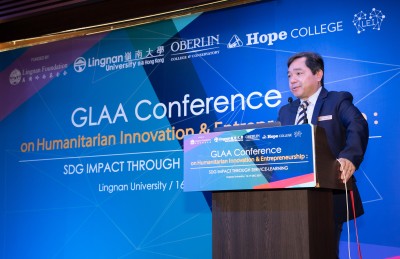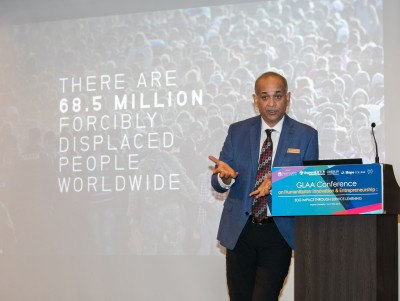
Lingnan University Successfully hosts the 2019 GLAA Conference on Humanitarian Innovation & Entrepreneurship: SDG Impact through Service-Learning
by Priyanka SEN
“The Sustainable Development Goals are the blueprint to achieve a better and more sustainable future for all. They address the global challenges we face, including those related to poverty, inequality, climate, environmental degradation, prosperity, and peace and justice. The Goals interconnect and in order to leave no one behind, it is important that we achieve each Goal and target by 2030.” -- United Nations
 From the 16th to the 17th of December, 2019, Lingnan University (LU) and the Office of Service-Learning (OSL) successfully co-organized the first Global Liberal Arts Alliance (GLAA) Conference on Humanitarian Innovation & Entrepreneurship (CHIE): SDG Impact through Service-Learning with Oberlin College and Conservatory (USA) and Hope College (USA.), at the CityView Hotel, Hong Kong. The interdisciplinary Conference was a first of its kind in GLAA history, bringing together scholars, academics, and higher education professionals representing 15 top liberal arts universities and colleges in the GLAA network from around the world. The Conference’s goal was to facilitate long-term partnerships aimed at contributing to the United Nations Sustainable Development Goals (UNSDGs) through Innovation and Entrepreneurship-focused (I&E) global Service-Learning programmes. Participants were invited to share their projects for improving the lives of marginalized populations across the world, collectively brainstorm ideas for expanding projects by collaborating with fellow GLAA members, and critically envision common road-maps for the GLAA to address selected SDGs over the next 5 years.
From the 16th to the 17th of December, 2019, Lingnan University (LU) and the Office of Service-Learning (OSL) successfully co-organized the first Global Liberal Arts Alliance (GLAA) Conference on Humanitarian Innovation & Entrepreneurship (CHIE): SDG Impact through Service-Learning with Oberlin College and Conservatory (USA) and Hope College (USA.), at the CityView Hotel, Hong Kong. The interdisciplinary Conference was a first of its kind in GLAA history, bringing together scholars, academics, and higher education professionals representing 15 top liberal arts universities and colleges in the GLAA network from around the world. The Conference’s goal was to facilitate long-term partnerships aimed at contributing to the United Nations Sustainable Development Goals (UNSDGs) through Innovation and Entrepreneurship-focused (I&E) global Service-Learning programmes. Participants were invited to share their projects for improving the lives of marginalized populations across the world, collectively brainstorm ideas for expanding projects by collaborating with fellow GLAA members, and critically envision common road-maps for the GLAA to address selected SDGs over the next 5 years.
 The conference also showcased Lingnan’s commitment to integrating technology and I&E with global Service-Learning programs such as the Joint-Humanitarian Summer Academy co-organized with many international partners and educational institutions. The CHIE aimed to connect GLAA university members to the programme in an effort to expand it in Asia and beyond, and to strengthen joint undergraduate research, student exchange programs, and course connections among GLAA members. The United Nations points to the importance of sustainable partnerships in order to achieve the SDGs. With this in mind, the CHIE broke away from the traditional emphasis on academic presentations in conferences and prioritized discussion, an exchange of practical ideas, and creating collective action items highlighting the potential of the Liberal Arts to meet social needs through innovation. Daily discussion agendas were initiated by plenary talks covering key ideas like Humanitarian Technology and Inclusive Entrepreneurship. These were followed by parallel discussion sessions where discussants or ‘Catalysts’ shared short presentations for specific projects and invited participants to share their own projects, propose improvements or solutions to challenges, and so on. Finally, the conference concluded with Planning and Report-back Sessions where all participants were tasked with consolidating ideas into action plans and sharing their ideas with the larger group.
The conference also showcased Lingnan’s commitment to integrating technology and I&E with global Service-Learning programs such as the Joint-Humanitarian Summer Academy co-organized with many international partners and educational institutions. The CHIE aimed to connect GLAA university members to the programme in an effort to expand it in Asia and beyond, and to strengthen joint undergraduate research, student exchange programs, and course connections among GLAA members. The United Nations points to the importance of sustainable partnerships in order to achieve the SDGs. With this in mind, the CHIE broke away from the traditional emphasis on academic presentations in conferences and prioritized discussion, an exchange of practical ideas, and creating collective action items highlighting the potential of the Liberal Arts to meet social needs through innovation. Daily discussion agendas were initiated by plenary talks covering key ideas like Humanitarian Technology and Inclusive Entrepreneurship. These were followed by parallel discussion sessions where discussants or ‘Catalysts’ shared short presentations for specific projects and invited participants to share their own projects, propose improvements or solutions to challenges, and so on. Finally, the conference concluded with Planning and Report-back Sessions where all participants were tasked with consolidating ideas into action plans and sharing their ideas with the larger group.
The conference was started off by a speech from Professor Joshua Mok Ka-ho, Vice-President and Lam Man Tsan Chair Professor of Comparative Policy, LU. In his speech, Prof. Mok stressed the importance of collective action in the pursuit of targets enshrined in the SDGs, “As we inch closer to 2030, the goals appear heavier and perhaps might even seem burdensome. It is thus time for us to come together and realize our hopes for our students and this world, through collaborative work that re-conceptualizes limitations as opportunities.” This was followed by a Pinning Ceremony for the new cohort of University Innovation Fellows. Conference deliberations began with the first plenary session led by Dr. Albert Ko, Director of OSL and the Lingnan Entrepreneurship Initiative (LEI). In his talk titled “A Blueprint of Liberal Arts Universities for Achieving SDGs”, Dr. Ko provided his compelling insights on redefining Service-Learning in the context of 21st century global challenges, sharing lessons from his own journey from being a young engineer working with relief organizations to an educator working on Service-Learning programs in the Liberal Arts that bring relief to vulnerable communities through simple technological innovations and entrepreneurial approaches.
The second plenary session, “Incorporation of UN SDGs and Resilience Framework in the Management of Refugee Camps: A Case Study of the Rohingya Refugees in Bangladesh” was led by Professor Md Rumi Shammin, Associate Professor of Environmental Studies at Oberlin College (USA). Prof. Shammin discussed his ongoing environmental sustainability projects in refugee crisis zones and how he envisions them within the UN SDGs framework, providing approaches for integrating impactful projects, research, and teaching. Four discussion sessions took place over the course of the rest of the day. Topics included programming in Humanitarian Technology and SDG-impact through research, combating discrimination in the access to resources, and making equal opportunity meaningful. Catalysts working on diverse projects presented their work and discussed the successes and practical challenges in scaling up impact-oriented initiatives to make them sustainable. Participants in each session also shared the progress of their own projects and provided insights on and proposed solutions to some of the challenges raised by catalysts. Some participants and Catalysts from Forman Christian College (Pakistan) also joined the sessions via video conference. The sessions sparked new discussions and created new possibilities for working together.
This spirit was carried into Day Two, which began with the first plenary session led by Professor Khanjan Mehta, Vice Provost of Creative Inquiry and Director of the Mountaintop Initiative at Lehigh University (USA). Prof. Mehta presented his approach to designing long-term student-driven impact projects and demonstrated a range of successful past and ongoing interdisciplinary initiatives in multiple locations worldwide, empowering communities struggling with access to basic needs through sustainable means, technological or otherwise. Professor Duncan Rinehart, Assistant Professor of Management at the School of Business Administration in Al-Akhawayn University (Morocco), conducted the second plenary session on the “Experience of Using Social Entrepreneurial Education Towards SDGs”. Prof. Rinehart shared insights from the Service-Learning components of this entrepreneurship and leadership courses where students are tasked with starting and running socially conscious local businesses addressing at least one SDG. The plenary sessions were followed by the last round of parallel sessions focusing on course connections and Service-Learning in the pursuit of SDG-impacts, and software support options available for data gathering with respect to UN SDG projects.
Finally, the conference was closed out by a group discussion and brainstorming session to build on the momentum gathered over the course of the previous days and create action items on how GLAA institutions can contribute to SDGs as a whole. Participants worked in small groups to consider the following areas: practical initial steps to foster collaborations (courses or otherwise) based on SDG areas of interest, ways to collaborate with the Summer Academy global Service-Learning model, more aspirational plans requiring planning and external funding, and infrastructure to facilitate information sharing across campuses to track impact. The session was facilitated by Dr. Albert Ko and Dr. Simon J.M. Gray, Program Officer at the GLAA. Participants pitched numerous ideas in line with the overarching goals of the discussion sessions and expressed enthusiasm to form a global impact network through the GLAA network specifically focusing on contributions towards the SDGs and Service-Learning goals smaller Liberal Arts institutions can make by collaborating and sharing resources. The sharing session also focused on the persisting need to define impact-measuring parameters and tangible, relevant institutional goals to better integrate the UN SDG framework into university and GLAA network-wide programming. With this, the 2019 GLAA CHIE officially came to a close, with participating members and institutions revitalized with the prospect of future, even bigger, opportunities to work across a network committed to education for change.

